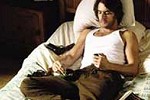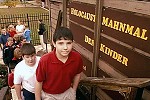 Arthouse films ’06
Arthouse films ’06< < M O R E | M O R E > >
last update 21.Jun.06
See also: SHADOWS FILM FESTIVAL | SHORT FILMS
 R E V I E W B Y R I C H C L I N E
R E V I E W B Y R I C H C L I N E aka Dave Chapelle’s Block Party
aka Dave Chapelle’s Block Party
 Director Michel Gondry and his cinematographer Ellen Kuras merge documentary and concert film genres in such a way that we feel like we're experiencing firsthand an energetic Brooklyn street party.
Director Michel Gondry and his cinematographer Ellen Kuras merge documentary and concert film genres in such a way that we feel like we're experiencing firsthand an energetic Brooklyn street party.
Comedian Chapelle planned the September 2004 event to reunite his musician pals and give something back to his community. Footage from the concert is intercut with rehearsals, interviews and a trip back to his hometown of Dayton, Ohio, where he recruits an entire marching band. And the concert itself is a significant mixture of urban music and pointed comedy, climaxing with a reunion of the Fugees (Hill, Jean and Pras) for the first time in seven years.
Gondry is a master at finding the surreal in everyday life, and he's clearly having fun here as he gets into Chappelle's mind, connecting his random thoughts and carefully pre-planned "improv" to the final performance. It's filmed with a bracing, unprocessed honesty that captures the edgy tone of the music and the sparky personalities of the performers. Chappelle is absolutely hilarious, and the chemistry he shares with his old pals (especially Mos Def) is infectious.
There are also a few terrific side-roads, such as interviews with the adjacent Broken Angel House's residents--an eccentric couple who doesn't understand or even like hip-hop but is open-minded enough to enjoy it on some level. By finding colourful characters like this all around the event, the film takes on a sort of narrative that carries us through and has a surprising resonance. And this is deepened by precise political commentary, such as the Dead Prez's comment that if you speak the truth in rap music you won't get any airplay.
Once the concert really kicks into gear, the film also captures the soaring passion of the audience--musical bliss and political zeal. And the performers really go for it. West is especially powerful on stage, and there are exceptionally strong numbers featuring Def, Badu and Scott, plus of course the Fugees on top form. As it proceeds, the film may feel a little long and repetitive, but you can't deny the raw force. And it's also a lot of fun.
scr Dave Chappelle
with Dave Chappelle, Mos Def, Kanye West, Jill Scott, Erykah Badu, Lauryn Hill, Wyclef Jean, Pras, Cody Chestnutt, Dead Prez, The Roots, Big Daddy Kane
 release US 3.Mar.06,
release US 3.Mar.06, UK 30.Jun.06
05/US Rogue 1h43
TORONTO FILM FEST
BERLINALE
19.Jun.06
 R E V I E W B Y R I C H C L I N E
R E V I E W B Y R I C H C L I N E Krišana
Krišana
 Fascinating but relentlessly arty, this quietly provocative mystery will reward patient viewers with a very cool story plus subtle observations about life in post-Soviet Eastern Europe.
Fascinating but relentlessly arty, this quietly provocative mystery will reward patient viewers with a very cool story plus subtle observations about life in post-Soviet Eastern Europe.
On a night in Riga, 30-something archivist Matiss (Dombrovskis) is walking across a footbridge when he sees a woman (Dzerve) perched on the railing. They exchange a glance and Matiss walks on, then is startled by the sound of a splash. He notifies the police, but the detective (Roga) seems disinterested, so Matiss starts sleuthing on his own. He discovers that the woman, Alina, has a husband and son (Keiss and Gailiss) and then tracks down her hot-blooded boyfriend (Korobov). But this only increases his sense of guilt.
Writer-director Keleman films in grainy black and white with long tracking shots that echo his mentor Bela Tarr. He then adds flashes of invention, both through the photography and sound mix, which give us surprising insights into the story and the characters. The overall effect is like watching a 1950s Soviet-era movie with a distinctly modern sensibility. If you added a Maltese Falcon-style voiceover, you'd have quintessential film noir.
In his performance, Dombrovskis creates gets the balance just right between Matiss' dull, weary life and his curiosity about this mystery woman. And since the camera literally tracks him right through the film, we get under his skin and experience the story with him. There's a bracing tension between his emotional response and his desire to just escape it all through another bottle of vodka. It's a thoughtful performance that's engaging and cleverly at odds with the more edgy people he meets.
As it proceeds, Keleman catches the culture brilliantly on screen, examining the state of life in such a worn-out place. The streets and landscapes look completely thrashed, while the gleaming internal halls of the library where Matiss works have a futuristic sci-fi feel. As he looks through Alina's photos, the film takes on the searching, puzzled mood of Antonioni's Blow-up as we head for the inspired final twist. Kelemen's mannered filmmaking style can feel indulgent, but every shot tells us something important. And if we let him carry us along, we're in for a daringly original and involving cinematic experience.
with Egons Dombrovskis, Nikolaj Korobov, Vigo Roga, Aija Dzerve, Gundars Silakaktins, Andris Keiss, Rihards Gailiss
 release US 9.Dec.05,
release US 9.Dec.05, UK 29.Sep.06
05/Latvia 1h28
KARLOVY VARY FEST
TORONTO FILM FEST
16.Jun.06
 R E V I E W B Y R I C H C L I N E
R E V I E W B Y R I C H C L I N E aka Wolf
aka Wolf
 MUST-SEE
MUST-SEE
 Based on a true story and shot like an urgent thriller, this Spanish film grabs hold right and never lets go. Not only does it tell an amazing story, but it's also eerily relevant.
Based on a true story and shot like an urgent thriller, this Spanish film grabs hold right and never lets go. Not only does it tell an amazing story, but it's also eerily relevant.
In the early 1970s, Franco's secret service put a mole called El Lobo inside ETA, the violent Basque nationalist group. Txema (Noriega) was a family man before the government operative (Coronado) recruited him, and their mission is so secret even his wife (Abascal) can't know about it. Which is a problem since she thinks he's joined the terrorists. But Txema works his way to the top, befriending an ETA leader (Bruel) who ruthlessly seizes power, as well as the strong woman (Doutey) at his side. Txema is in a very dangerous position indeed.
This is a stomach-churning story that keeps twisting and tightening right to the harrowing climax. Txema's odyssey runs along the knife-edge between life and death, loyalty and treachery. And he can't really trust anyone--the cops are shifty and his comrades are frighteningly unstable. As the story progresses, we are given a jarring insight into his life, and Noriega's terrific performance makes it thoroughly involving.
Director Courtois accentuates this tone with a 1970s vibe that's quick and slick and focuses completely on Txema's moral dilemmas. The only simplification is in the portrayal of the stone-faced, glory-seeking cops who care more about getting a medal than they do about justice; they need the terrorists so they can cement their power. But in Franco's Spain this is probably realistic. Indeed, we can see parallels in our own governments.
The dialog is a bracingly authentic of Spanish and Basque dialog that outlines and clarifies (and probably simplifies) the Euskal Herria situation. These thematic aspects emerge naturally, with complexity and emotional resonance. But this is cleverly submerged in a ripping plot that jumps and races and keeps us on our toes with interpersonal clashes, moments of aching betrayal, interludes of both love and pain, and jarringly realistic gunfights. It's a tough, exciting, important film that deserves to be seen as widely as possible.
scr Antonio Onetti
with Eduardo Noriega, José Coronado, Mélanie Doutey, Silvia Abascal, Patrick Bruel, Santiago Ramos, Jorge Sanz, Fernando Cayo, Roger Pera, Juan Fernández, Manuel Zarzo, José Luis García-Pérez

release Sp 5.Nov.04,
UK 16.Jun.06
04/Spain 2h05
12.Jun.06
 R E V I E W B Y R I C H C L I N E
R E V I E W B Y R I C H C L I N E
 This documentary tells a powerfully important story, even though the filmmakers get far too caught up in both the story and the significant emotions swirling around it.
This documentary tells a powerfully important story, even though the filmmakers get far too caught up in both the story and the significant emotions swirling around it.
In small-town Whitwell, Tennessee, teachers Hooper, David Smith and Roberts were concerned that their students had no way of understanding tolerance, because of their all-white protestant community. The 13-year-olds came up with the idea: paper clips were invented in Norway, where they were used as a symbol of wartime resistance. So to understand the concept of what Hitler did to the Jews, the children would collect 6 million paper clips. As journalists (the Schroeders) adopted the story, some 30 million clips arrived. And the school created a permanent memorial to house 11 million of them, representing 6 million Jews and 5 million others killed by the Nazis.
This evocative story is loaded with urgency and relevance. And the filmmakers spent years with the teachers and students, telling it beautifully from every side, including the intimate, personal responses of people touched by the project. As the task develops, the students are visited by Holocaust survivors ("They look just like my grandparents") and they take possession of a German freight car to house their memorial.
While the project is laudable in every conceivable way, this film leaves a nagging sense that for a true understanding of tolerance in this Bible Belt community, located just 30 miles from the site of the 1925 Scopes Trial and 100 miles from the Ku Klux Klan's birthplace, the students perhaps should have taken on Aids in Africa. Or even Aids in America. Would these deeply religious students' tolerance extend to embracing a gay person?
These kinds of thoughts emerge while watching this film, mainly because of the filmmakers' earnest, heart-wringing, somewhat arrogant approach. Yes, what these children are learning is utterly essential, and they're doing it in a creative, meaningful way. But they're celebrating the fact that they live in a free country with their extended family around them, rather than understanding the fact that, first, their lifestyle represents a tiny minority in the world, and second, it's an illusion.
scr Joe Fab
with Linda Hooper, David Smith, Sandra Roberts, Peter Schroeder, Dagmar Schroeder-Hildebrand, Dita Smith, Casey Condra, Cassie Crabtree, Sheila Gluck Levine, Bernard Igielski, Linda Pickett, Tom Bosley
 release US 8.Sep.04,
release US 8.Sep.04, UK Aug.06
04/US 1h27
TRIBECA FILM FEST
5.Jun.06


See also: SHADOWS FILM FESTIVAL | SHORT FILMS
© 2006 by Rich Cline, Shadows
on the Wall